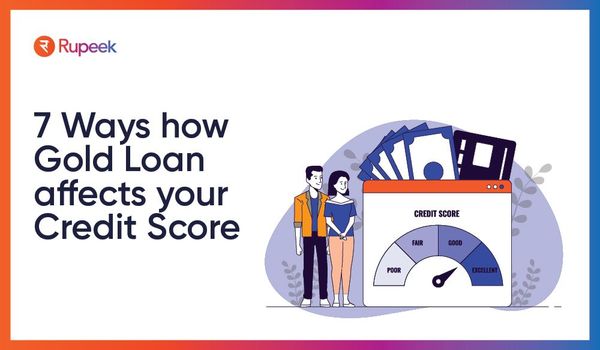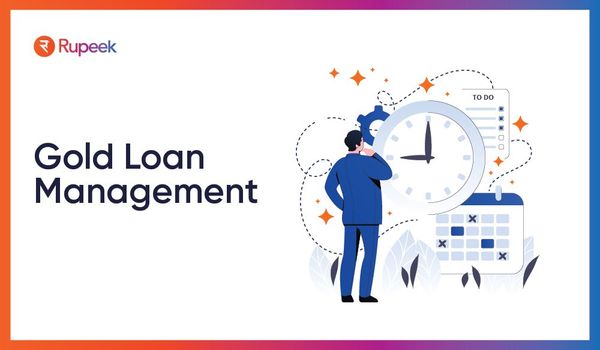If you have borrowed or are willing to avail of any loans, you must already know the applicability of credit score, especially for unsecured loans. Most lenders view the CIBIL score as an essential aspect as it reflects an individual’s credit behavior depending on several factors. Among these factors are one’s practices related to gold loans.
If you are willing to improve your credit score, know how a gold loan can impact this figure. In case you are wondering why you should maintain a high CIBIL score, you need to know its importance first.
How Important Is Your CIBIL Score?
The CIBIL score is a numerical indication of your complete repayment history and credit behavior to date. For most lenders, this 3-digit number acts as a first impression of an applicant. Although it can range from 300 to 900, a credit score above 750 is considered decent by most financial institutions. A higher CIBIL score contributes to greater eligibility and helps individuals to avail advantages, such as lower interest rates.
Conversely, a credit score below 500 indicates low credibility, which can make it difficult for individuals to avail unsecured and even some secured loans.
Does Gold Loan Impact Credit Score?
Gold loans can make or break your credit score in the following 7 ways:
- Frequency of gold loan application
- Past loan applications
- Credit mix
- Existing gold loan debts
- Gold loan default
- Loan settlement
- Auctioning off gold items
Let’s dive into the details.
- Frequency of gold loan application
Applying for a gold loan or any other type of credit, in general, leads to the lender conducting a hard inquiry. This involves financial institutions extracting an applicant’s credit report from credit bureaus to assess his/her creditworthiness. Multiple loan applications within a short span will lead to numerous credit inquiries at the same time. This, in turn, is reflected in the credit report and can make you appear desperate for credit. As a result, it can eventually bring down your CIBIL score.
- Past loan applications
Your credit score is based on your financial records, concerning your past borrowings, credit behavior, and repayment history, among others. In this case, individuals applying for a loan for the first time may not have significant financial information to help determine the degree of risk they pose for lenders. As a result, no credit history naturally leads to a low CIBIL score.
- Credit mix
As already mentioned, having a history of zero borrowings can result in a lower score. Conversely, having a combination of unsecured and secured loans in your borrowing history can help augment your credit score. Individuals can opt for secured funding like a gold loan during times of emergencies. This can be a convenient option for both the borrower and lender, given its flexible terms and collateral security. Under other circumstances, individuals can opt for unsecured financial products to maintain a healthy credit mix.
Here is an example to illustrate the ideal situation to combine different modes of credit. For instance, you already have an ongoing business loan, and you come across a minor cash crunch during this period. Here, a wise solution would be opting for a gold loan at convenient terms instead of seeking another unsecured loan.
- Existing gold loan debts
Borrowers already dealing with an unfinished gold loan are likely to have a lower credit score. This is because around 30% of your CIBIL score depends on your outstanding debt during the score evaluation. A substantial amount of outstanding debt can negatively impact your CIBIL score and impact your eligibility for an additional loan.
- Gold loan default
Defaulting on a gold loan will have a negative impact on your credit report. As a result, your CIBIL score will go down. Therefore, it is advisable to clear all dues, if any, to pull up your credit score.
- Loan settlement
Along the lines of the previous point, when clearing your outstanding loans, gold-backed or otherwise, make sure to receive a formal closure certificate from the lending institution. Confirm that your loan has a status of “closed” and not “settled”. The former indicates full repayment of dues along with other charges if any.
However, a “settled” status indicates that you paid a payoff amount lower than the original amount instead. This is an indication of your inability to repay and the subsequent loss suffered by the lender. This will have a negative impact on your credit score.
- Auctioning off gold items
While late payments can have a negative effect on your CIBIL score, secured loan providers hold the power to auction off collaterals in case of a default. The same is applicable for gold items. In such a scenario, you not only risk losing your valuables, but your credit score will also take a hit.
Therefore, it is advisable for borrowers to avoid defaults or settlements as much as possible.
Now that you are aware of the different gold loan factors affecting your credit report, it is time to understand the ways in which you can improve your CIBIL score.
How Can I Make My CIBIL Score Strong?
Individuals can adopt the following practices to enhance their credit score significantly:
- Prioritize timely repayment
- Opt for longer repayment tenures
- Clear existing dues
- Maintain a decent debt-to-income ratio
- Maintain a healthy credit utilization ratio
- Avoid extending your credit card limit frequently
- Check and update your credit report periodically
Keep reading to know more about each of these ways.
- Prioritize timely repayment
Missing out on even one installment can have a negative effect on your credit score. Therefore, individuals must ensure making necessary payments within the due date, even if it means compromising a little on luxury expenses or cutting them off altogether for the entire loan tenure.
- Opt for longer repayment tenures
Individuals struggling with hefty monthly repayments can opt for a long loan duration to relieve the burden. A longer tenure will bring down the EMI amount, making it easier for borrowers to repay on time and prevent defaults. Consequently, these timely repayments will help pull up their CIBIL score significantly.
- Clear existing dues
As you must already know by now, outstanding dues impact your CIBIL score negatively. Therefore, if you have any dues, an instant solution to improving your credit score is to repay these amounts, along with late penalties, if applicable.
- Maintain a decent debt-to-income ratio
Your debt-to-income (DTI) ratio is the percentage of your gross monthly income that goes into repaying existing debts. While this does not directly impact your credit score, a DTI ratio higher than 43% is an indication of financial stress.
Most financial institutions prefer candidates with a DTI ratio lower than 36%. This is to ensure borrowers have adequate finances to repay debts in time. As a result, maintaining a lower DTI ratio will help you to have a good credit report.
- Maintain a healthy credit utilization ratio
Besides the DTI ratio, individuals must also focus on maintaining a low credit utilization ratio. This is the percentage of credit used from the total available limit on all your credit cards.
For instance, you have 2 cards with limits of Rs.1 lakh and Rs.50,000, respectively. Therefore, your total available credit limit is Rs.1.5 lakh. Now, if you use a total of Rs.30,000 from all cards, your credit utilization ratio will be Rs.30,000 divided by Rs.1.5 lakh, leading to 20%.
Most lending institutions prefer this limit to be less than 40%, which indicates healthy financial behavior. Therefore, individuals can curb excessive credit usage and pay credit card bills timely to lower this ratio and improve their CIBIL score.
- Avoid extending your credit card limit frequently
Increasing your credit card limit too often can make lenders view you as someone highly dependent on credit to manage their finances. This is because lending institutions evaluate an applicant’s net worth by subtracting liabilities from assets before sanctioning funds, and a high credit limit makes for a huge liability. Therefore, just like applying for too many loans, extending your credit card limit too frequently can bring down your CIBIL score.
- Check and update your credit report periodically
Your credit report might have errors of sorts, such as a record of loan default even after complete repayment or errors in your names’ spelling. This is why it is highly important that you perform periodical CIBIL score checks to update all necessary information and make sure it is error-free. Performing a credit score check is especially important just before you apply for a financial product to ensure you meet the eligibility standards.
Besides adopting the following practices, you can also avail a gold loan in times of financial crisis to improve your credit score. Here’s how!
Get Gold Loan with a Poor CIBIL Score
Availing of financial products like a personal loan or a small business loan without a good CIBIL score can be extremely difficult. Plus, even if you manage to acquire one, the lending institution will charge high-interest rates to compensate for the lack of creditworthiness.
Under such circumstances, individuals can opt for a gold loan from leading online lenders like Rupeek Fintech. Besides offering funds without performing CIBIL checks, Rupeek offers the following advantageous features with its gold-backed loans:
- High loan amount: Individuals can avail funds up to Rs.1.5 crore against gold jewelry, with our highest LTV rate of 80%.
- Short repayment tenure: Rupeek’s gold loan comes with a tenure of 6 months, which can be extended up to 12 months. Such compact loan tenure reduces the interest outgo in the long run. At the same time, borrowers can avail and complete a loan quickly without burdening themselves over long periods.
- Competitive interest rates: Borrowers can enjoy interest rates as low as 0.49% with our affordable financing solutions. You can also use our online loan calculator to determine the monthly and total interest payable against your required funds in advance. This can aid in better financial management throughout the loan tenure. Also, you can choose any one of the multiple schemes which are best suited for you.
- Flexible repayment schemes: Rupeek offers various loan repayment options to help borrowers choose one according to their suitability. You can either repay in traditional monthly EMIs or pay any amount at any time during the tenure. The latter also includes a one-time bullet payment facility.
- Gold loan overdraft: Besides the above benefits, we also offer a credit line facility, known as Rupeek Quick, which is exclusive to existing customers. Borrowers with an existing loan can pledge some additional gold items to avail funds via their in-app wallet as and when necessary. Additionally, they only need to pay interest against the used amount and not the entire limit.
Rupeek aims to make affordable funding solutions easily available with the above set of beneficial features. Such customer-friendly terms can help borrowers repay a gold loan on time without overburdening their finances. As a result, gold-backed funds can help individuals build their CIBIL score significantly over time.
If you are looking for easy ways to improve your credit report, apply for a Rupeek gold loan at the earliest!





